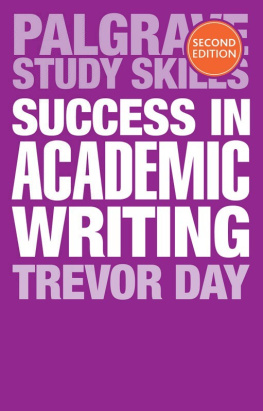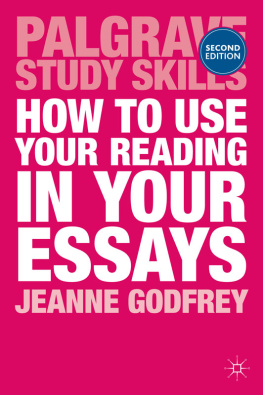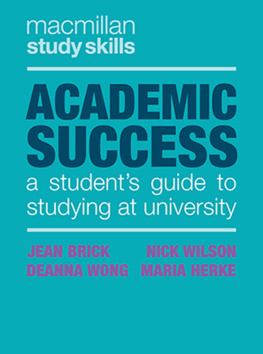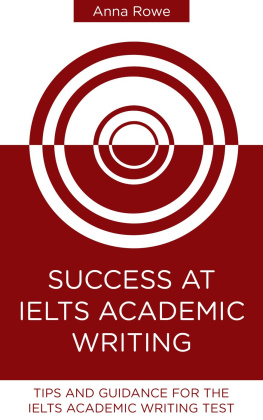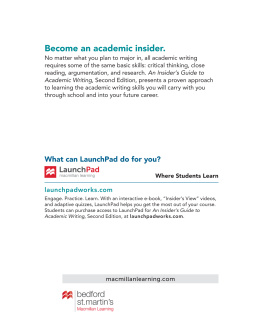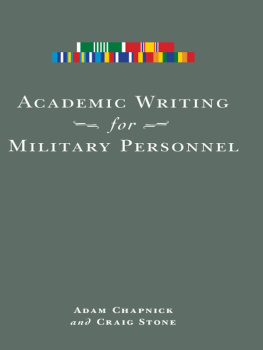Success in Academic Writing
www.palgravestudyskills.com the leading study skills website
For a complete listing of all our titles in this area please visit www.macmillanihe.com/study-skills
Palgrave Study Skills
Business Degree Success
Career Skills
Cite Them Right (10th edn) e-Learning Skills (2nd edn) Essentials of Essay Writing
Get Sorted
Great Ways to Learn Anatomy and Physiology (2nd edn)
How to Begin Studying English Literature (4th edn)
How to Study Foreign Languages
How to Study Linguistics (2nd edn)
How to Use Your Reading in Your Essays (2nd edn)
How to Write Better Essays (3rd edn)
How to Write Your Undergraduate Dissertation (2nd edn)
Improve Your Grammar (2nd edn) Information Skills
The International Student Handbook
The Mature Students Guide to Writing (3rd edn)
The Mature Students Handbook
The Palgrave Student Planner
The Personal Tutors Handbook
Practical Criticism
Presentation Skills for Students (3rd edn)
The Principles of Writing in Psychology Professional Writing (3rd edn)
Researching Online
The Student Phrase Book
The Students Guide to Writing (3rd edn)
Study Skills for International Postgraduates Study Skills for Speakers of English as a Second Language
Studying History (4th edn)
Studying Law (4th edn)
Studying Modern Drama (2nd edn)
Studying Psychology (2nd edn) Studying Physics
Success in Academic Writing (2nd edn)
Smart Thinking
The Undergraduate Research Handbook
The Work-Based Learning Student Handbook (2nd edn)
Work Placements A Survival Guide for Students
Write it Right (2nd edn)
Writing for Engineers (4th edn)
Writing for Law
Writing for Nursing and Midwifery Students (2nd edn)
Writing History Essays (2nd edn)
Pocket Study Skills
14 Days to Exam Success
Analyzing a Case Study
Blogs, Wikis, Podcasts and More
Brilliant Writing Tips for Students Completing Your PhD
Doing Research (2nd edn)
Getting Critical (2nd edn)
Planning Your Dissertation
Planning Your Essay (2nd edn)
Planning Your PhD
Posters and Presentations
Reading and Making Notes (2nd edn)
Referencing and Understanding Plagiarism (2nd edn)
Reflective Writing
Report Writing
Science Study Skills
Studying with Dyslexia (2nd edn)
Success in Groupwork
Time Management
Wheres Your Argument?
Writing for University (2nd edn)
Palgrave Research Skills
Authoring a PhD
The Foundations of Research (2nd edn) Getting to Grips with Doctoral Research Getting Published
The Good Supervisor (2nd edn)
PhD by Published Work
The PhD Viva
Planning Your Postgraduate Research The PhD Writing Handbook
The Postgraduate Research Handbook (2nd edn)
The Professional Doctorate
Structuring Your Research Thesis
Palgrave Career Skills
Excel at Graduate Interviews
Graduate CVs and Covering Letters
Graduate Entrepreneurship
How to Succeed at Assessment Centres
Social Media for Your Student and Graduate Job Search
The Graduate Career Guidebook Work Experience, Placements and Internships

Successin Academic Writing
Second edition
Trevor Day

Trevor Day 2018
All rights reserved. No reproduction, copy or transmission of this publication may be made without written permission.
No portion of this publication may be reproduced, copied or transmitted save with written permission or in accordance with the provisions of the Copyright, Designs and Patents Act 1988, or under the terms of any licence permitting limited copying issued by the Copyright Licensing Agency, Saffron House, 610 Kirby Street, London EC1N 8TS.
Any person who does any unauthorized act in relation to this publication may be liable to criminal prosecution and civil claims for damages.
The author has asserted his right to be identified as the author of this work in accordance with the Copyright, Designs and Patents Act 1988.
First published 2018 by
PALGRAVE
Palgrave in the UK is an imprint of Macmillan Publishers Limited, registered in England, company number 785998, of 4 Crinan Street, London, N1 9XW.
Palgrave and Macmillan are registered trademarks in the United States, the United Kingdom, Europe and other countries.
ISBN 9781352002041 paperback
This book is printed on paper suitable for recycling and made from fully managed and sustained forest sources. Logging, pulping and manufacturing processes are expected to conform to the environmental regulations of the country of origin.
A catalogue record for this book is available from the British Library.
A catalog record for this book is available from the Library of Congress.
To Anthony and Tessa, a continuing source of inspiration
Contents
Preface to the Second Edition
This book is written for university undergraduates in a wide range of disciplines within social sciences, sciences, engineering, arts and humanities. It will be valuable for students writing at university level for the first time as well as those in their final undergraduate year. It will also be useful for postgraduates on taught courses who have had little recent experience of academic writing. The book focuses on coursework assignments, but the principles of good writing apply to examination answers, so the lessons you learn from assignment writing can be used to help prepare for written examinations.
The book works on the principle that academic writing, like other forms of writing, needs to be tailored to its specific context its purpose and audience. Nevertheless, there are general principles that apply to many kinds of academic writing. Using examples, reflections and self-study activities, the book takes you through the various aspects of academic writing one step at a time. It includes examples from a wide range of disciplines so that you should be able to find some that meet your disciplinary requirements, as well as others that give general principles that you can apply to your discipline.
You do not need to read through this book from beginning to end. Some of you will want to. Others will want to dip into it according to need. Whatever your preference, there are certain chapters and sections that are more vital than others. I suggest that you read first, as it sets the scene for the rest of the book. All the other chapters assume that you are familiar with the content of the first chapter. Chapters are divided into numbered sections to assist you in navigating through the book.
Most of the book is written in a relaxed style as though I, the writer, am helping you, the reader, work step-by-step through various aspects of academic writing. The writing style is different from that of academic writing itself and is more like a conversation a tutor might have with you when discussing your writing. Although the style is quite casual, it is nevertheless rigorous. For example, I will use appropriate conventions for citing and referencing, so demonstrating the practice expected of you in academic writing. A summary of key points is given at the end of each chapter, along with a list of references cited in that chapter plus any suggested further reading and answers to self-study activities. A glossary of terms and a complete listing of references are given at the end of the book.
Next page
